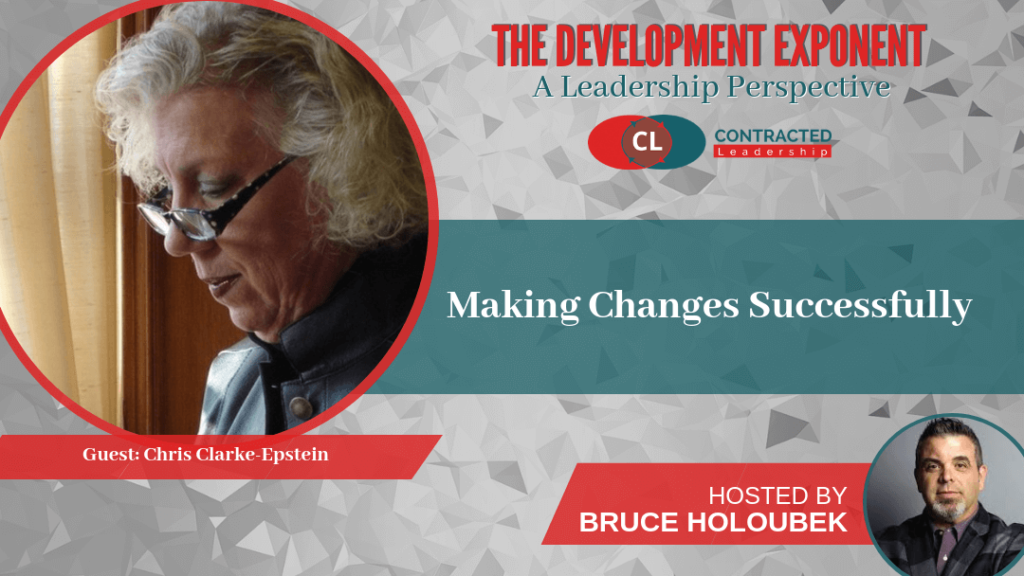
No matter what kind of development you are exposing yourself to there comes a moment when you need to decide if you’re going to put your new ideas into action. When you’re willing to change your current behavior thoughts and patterns, is when your learning takes on true value.
When making change remember: 1. The change is bigger in their minds than in yours. 2. Change is not a biologically favored event. 3. You’ve had time to think through it, they need time. 4. The change was your choice, not theirs. 5. Share the… Click To TweetHowever, change is a strange thing that affects each of us differently. Some people hate it all, some are okay with some of it, while others live for it. Chris Clarke-Epstein made it her life’s work to figure out why some people fall into these groups. She is an internationally known writer and speaker, she’s written and contributed to 14 books and numerous articles, one of her books has been translated into 12 languages, she served as the 2000-2001 National Speakers Association President, and has received awards from her peers. To learn about the topic, Bruce Holoubek, owner of Contracted Leadership, and Host of The Development Exponent Podcast talks to Chris about change management in developing leaders, practical strategies for change, and how it relates to mutually-meaningful work engagements.
First, we look at what it means to navigate change successfully for you as an individual.
If you have lived a long enough life professionally or personally you can look back and see the plans you have made and how they did or didn’t work out. The measure of success of your life is how you dealt with those bends in the road. The changes that come at us can overwhelm us in the moment, and the trick for success in life is recognizing that it is the amount of time it takes for us to move from the overwhelm of “I can’t deal with this,” to the “I have to figure out new strategies” stage. With experience, the amount of time between the two shortens. What stopped you in your tracks earlier in life, later becomes something that you know you can get through by gathering your resources and moving ahead.
It’s not the people with the titles or positions who are the necessary influencer– it’s the people with personal power. Have them on your side when introducing change. #levelupyourleadership #leadership #contractleaders Click To TweetFor creating change in your organization the perspective widens, and we find ourselves needing to think beyond our personal strategies for adaptation. Before you start shifting gears in your organization, understand the following:
- The change is bigger in their minds than in yours.
- Change is not a biologically favored event.
- You’ve had time to think through the change, your people need time to adjust.
- The change was likely your choice, and not theirs.
- Share the inspiration that hit you when you wanted to make the change.
- You must have a sustained effort to help your changes succeed.
When we introduce a change from our perspective it is just that change, but from the recipient’s perspective it is not just about one change– there is usually a whole host of things and the ramifications of that change are going to be much more significant than the change itself. Your change may be affecting the recipient’s entire structure of how they go about their day, or how they manage their productivity. It can be as big as the recipient needing to rearrange childcare, petcate and errand schedules to as small as reconfiguring if they can make photocopies on the way to a meeting or not. So, the first thing as a leader you need to recognize is that people are responding to the totality of the experience.
When we introduce a change from our perspective it is just that change, but from the recipient's perspective it is not just about one change– there is usually a whole host of things and the ramifications of that change are going to be much more… Click To TweetMoreover, human beings are hardwired to not want to change. Status quo is what your brain likes: figure out how to do it and replicate it. Change is physically inefficient because it forces your brain to consume more oxygen, leaving less for your body oxygen for your body, thus making it less efficient. So, when you are frustrated that you people are “just not good at change,” remember that they are just being good at being human.
Also, keep in mind that takes time. You have had time to absorb the ramifications of the change, but your people have not. For example, if you are opening a new office, maybe you’ve had time to drive by the nearest grocery store or coffee shop, or figure out the traffic patterns in the area. When announcing the location of the new office, you already have the whole map in your head, while your people are just beginning to wonder what this will mean to their daily routine.
You must have a sustained effort to help your changes succeed. If you are constantly bringing new ideas and changes to your people, implementing those ideas but not following through with them (making sure they stick,) your ideas and changes will… Click To TweetIf you are bringing your change ideas from a seminar or development workshop that you attended, recognize that you were the one to hear all of the great points about it and you were the one to feel the inspiration. Your people weren’t there. You may be feeling excitement, but have you shared the “why” of that excitement with your team? You’ve experienced the “sales pitch,” so to speak, so now you have to sell it to them.
No matter what kind of development you are exposing yourself to there comes a moment when you need to decide if you're going to put your new ideas into action. When you're willing to change your current behavior thoughts and patterns, is when… Click To TweetYou must have a sustained effort to help your changes succeed. If you are constantly bringing new ideas and changes to your people, implementing those ideas but not following through with them (making sure they stick,) your ideas and changes will quickly lose credibility. You will see this in the conversation between the new employee and the old employee when the new employee shows excitement for the change, and the old employee responds with, “Just wait. Next month it will be something else and we will forget about this thing.”

